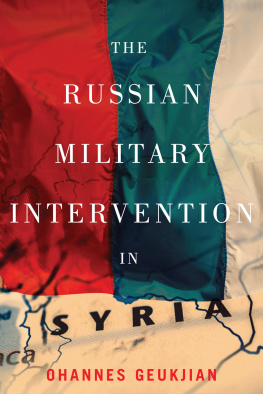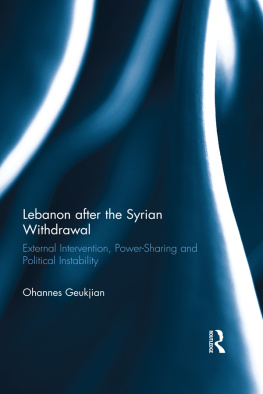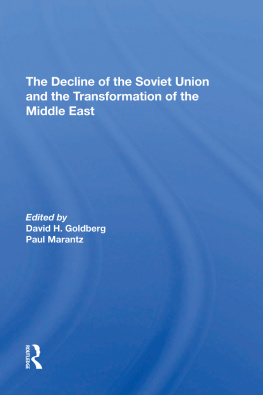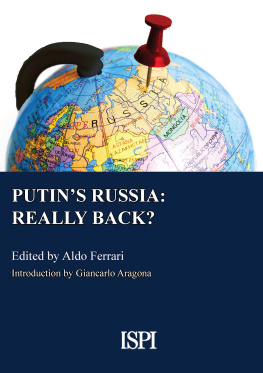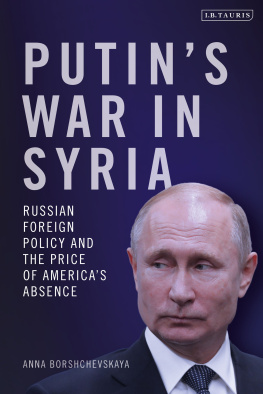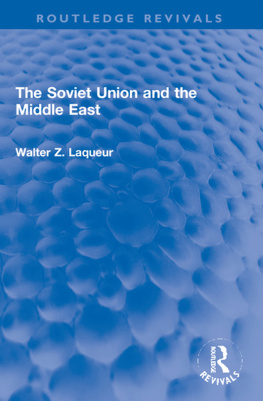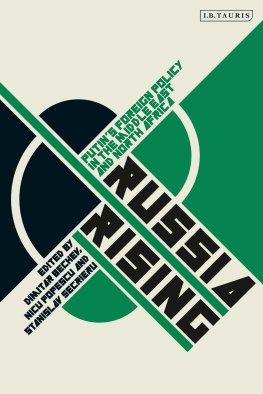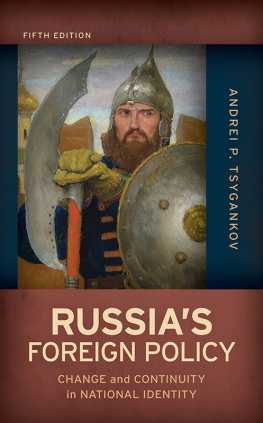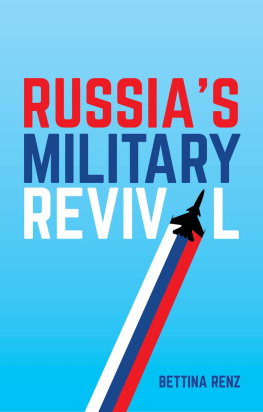Contents
Page List
Guide

THE RUSSIAN MILITARY INTERVENTION IN SYRIA
The Russian Military Intervention in Syria
OHANNES GEUKJIAN
McGill-Queens University Press
Montreal & Kingston London Chicago
McGill-Queens University Press 2022
ISBN 978-0-2280-0829-3 (cloth)
ISBN 978-0-2280-0830-9 (paper)
ISBN 978-0-2280-0945-0 (ePDF)
ISBN 978-0-2280-0946-7 (ePUB)
Legal deposit first quarter 2022
Bibliothque nationale du Qubec
Printed in Canada on acid-free paper that is 100% ancient forest free
(100% post-consumer recycled), processed chlorine free.
Library and Archives Canada Cataloguing in Publication
Title: The Russian military intervention in Syria / Ohannes Geukjian.
Names: Geukjian, Ohannes, author.
Description: Includes bibliographical references and index.
Identifiers: Canadiana (print) 20210312386 | Canadiana (ebook) 20210312408 | ISBN 9780228008309 (paper) | ISBN 9780228008293 (cloth) | ISBN 9780228009450 (ePDF) | ISBN 9780228009467 (ePUB)
Subjects: LCSH: SyriaHistoryCivil War, 2011 | LCSH: Russia (Federation)Foreign relationsMiddle East. | LCSH: Middle EastForeign relationsRussia (Federation) | LCSH: Russia (Federation)Foreign relations. | LCSH: Russia (Federation)Military policy.
Classification: LCC DS98.6 .G48 2022 | DDC 956.9104/23347dc23
This book was typeset by True to Type in 10.5/13 Sabon
Contents
THE RUSSIAN MILITARY INTERVENTION IN SYRIA
INTRODUCTION
Theoretical Framework, Methodology, and Structure
This book has its earliest origins in two research papers I presented at the Association for the Study of Nationalities World Convention in New York in 2017 and 2018. The papers are entitled The Objectives of Russias Military Intervention in Syria and Russias Mediation in the Syrian Conflict: Using Leverage to Make Peace. The panels covered topics about Russia and Russian foreign policy behaviour after the collapse of the Soviet Union in 1991. The dramatic political and military events that had occurred from 1994 to 2015 were causing security threats to Moscow and threatening the national interests of Russia in the former Soviet republics (FSR), Europe and the Middle East (ME); as a result, the panels attracted a number of colleagues. What prompted me to write this book is that the Russian annexation of the Crimea in 2014 shocked many observers in the West, even scholars of the region who should have predicted Russias behaviour. Russias military intervention in both Ukraine and, subsequently, Syria in 2015 were a response to Russias growing frustration with American and Western policy. This book will analyze the history of that growing frustration and provide a framework for understanding it. A number of books that have been written have attempted to explain Russias actions in Ukraine and Syria; what makes this book different is that it provides a detailed analysis of the causes and objectives of Russias actions in the FSR and the ME. This book highlights the relationship between status inconsistency and conflict. It demonstrates Russias search for higher status and the conflict this quest generated with major power actors; Russias use of military power in its foreign policy as a means to enhance status seemed highly counter-productive. This book also provides ample evidence of Russias status dilemma dynamics and how Russia sought to restore its great power status after the end of the Cold War. This book is also different in that it examines how Russia signalled its status claims through diplomatic initiatives in Syria and the ME by using its United Nations Security Council (UNSC) seat and pursued leadership in international negotiations. Russia used power politics and tried to act as the sole power broker in the ME by mediating regional conflicts and highlighting its role in global politics, while suffering from a persistently weak economy that rendered a military intervention in Syria and its immediate neighbourhood quite costly. This book aims to present to all scholars, journalists, policy makers, and educated readers what is happening in the ME and Eastern Europe.
This book is not written for international relations (IR) specialists. The aim is not to describe the state of Russian IR theory but to give an idea of what Russia is doing in the ME. The aim is also to analyze and explain the causes of Russian behaviour and action in Syria. Interested readers, who are not IR specialists, are invited to extrapolate from their intuition. The average reader has to understand what Russia is doing in Syria and why. Equally important, this book aims to capture an audience that is interested in geopolitics, international conflict management, and conflict resolution.
In the early 1990s, Russia sought a partnership with the West in order to promote democratic values and to integrate itself in Western political and economic structures. However, in the second half of the 1990s, when Russias interests were ignored by the West, Russian foreign policy became assertive. Russia sought to restore its lost status, prestige, and influence in global politics. In the post-Cold War era, a number of events caused tension between Russia and the United States and prompted Moscow to reorient its foreign policy away from the West. For example, the North Atlantic Treaty Organizations (NATO) enlargement policy that began in 1999, the colour revolutions in Georgia in 2003, Ukraine in 2004, and Kyrgyzstan in 2005, the Arab Spring, and NATOs 2011 intervention in Libya, which led ultimately to the ousting of Libyan authoritarian ruler Muammar Gaddafi. All of these events heightened Russias resentment. Still, Moscow perceived the colour revolutions, supported by the West, as a challenge to Russias exclusive status in the near abroad. In the literature on status, Thomas Volgy described Russia as a status-inconsistent-power, more precisely status-overachiever, which has more status than capabilities. Status-overachievers usually avoid conflict and try to preserve the status quo, which usually provides them with more international influence and recognition from other major powers than their resources would actually warrant. Taking action to change this status quo would mean investing significant resources and potentially losing over-achiever status. Status-overachievers can become quite aggressive in their immediate neighbourhood when their regional leadership is challenged. According to status-seeking theory, Russia would be unwilling to give up its leadership position in the near abroad and therefore would risk conflict to defend it. With regard to Ukraine, in line with power shift theory, it could be argued that Russian power politics were aimed at defending the countrys regional leadership.
The Syrian revolution that began in 2011 alarmed Russian leaders and antagonized them. Russia saw that the US had returned to its Cold War-era policy of regime change in foreign countries. For Russia, the loss of client regimes in Libya, Ukraine, and Syria was a major blow to its status, mainly because Russia lost part of its zone of influence and geostrategic interests in Ukraine and the ME. I will examine Russian power politics in Ukraine and Syria separately within the context of Russias status-seeking strategy.
Some scholars of IR, such as John J. Mearsheimer, have argued that Washingtons propensity to treat post-Soviet Russia as a defeated enemy and its failure in managing Russias transition from an expansionist communist empire to a more traditional great power, explains why Russia sought to achieve great power status by risking military conflict. Other members of the major power club continued to recognize it as an equal, even giving its membership into the Group of 8 (G8) in 1998, and did not contest its permanent seat in the UN Security Council. Meanwhile, Russia increased its military capabilities and commitment in its engagement in global affairs and sought recognition of its self-defined identity as a major power. In 2008, Russia invaded Georgia and in 2014 it intervened in Ukraine by annexing the Crimea to prevent both countries from joining NATO and to stop the European Union (EU) from creating a zone of influence near Russias borders. Russias annexation of the Crimea was a revisionist move, not typical of status-inconsistent powers.

